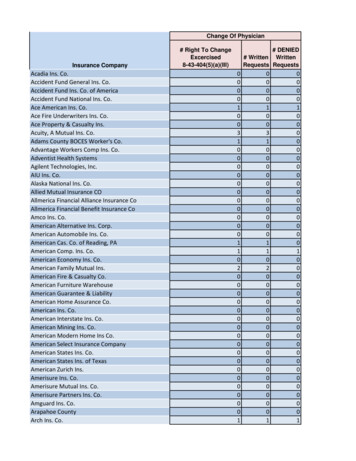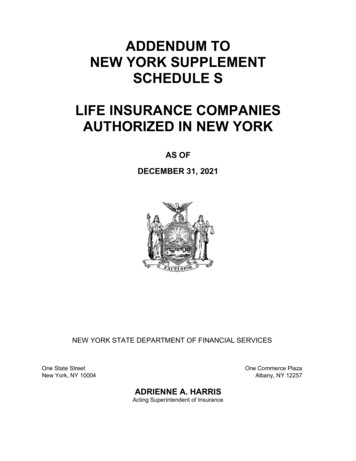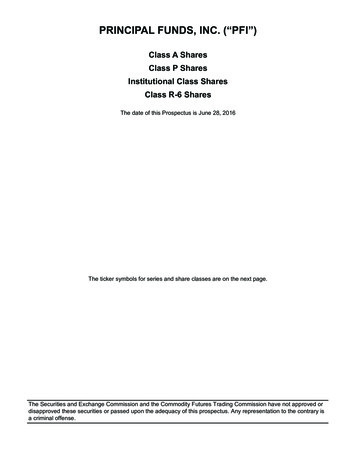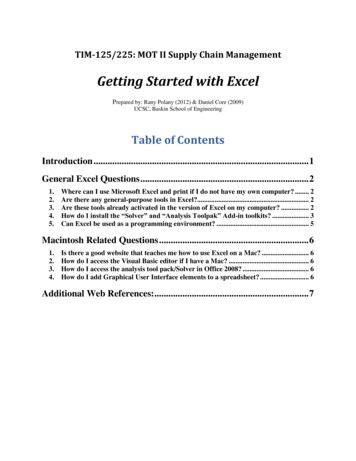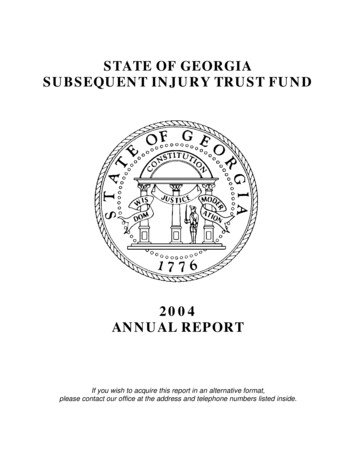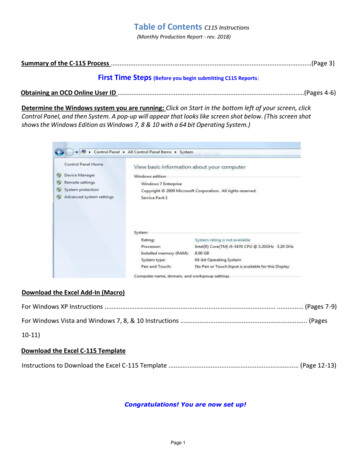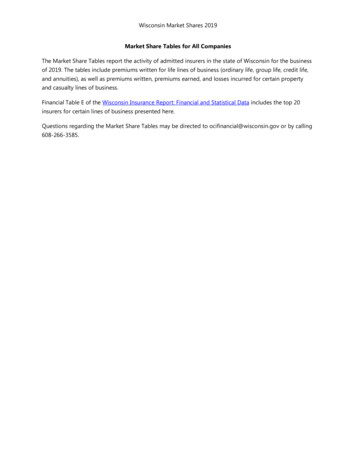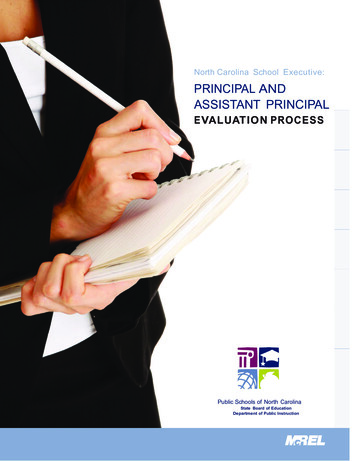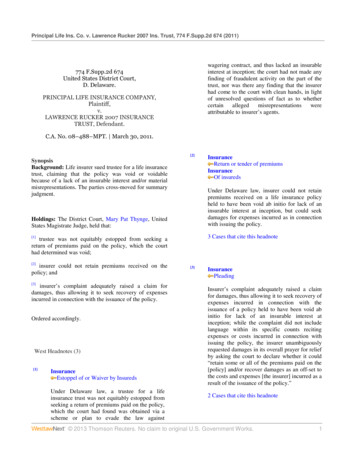
Transcription
Principal Life Ins. Co. v. Lawrence Rucker 2007 Ins. Trust, 774 F.Supp.2d 674 (2011)wagering contract, and thus lacked an insurableinterest at inception; the court had not made anyfinding of fraudulent activity on the part of thetrust, nor was there any finding that the insurerhad come to the court with clean hands, in lightof unresolved questions of fact as to table to insurer’s agents.774 F.Supp.2d 674United States District Court,D. Delaware.PRINCIPAL LIFE INSURANCE COMPANY,Plaintiff,v.LAWRENCE RUCKER 2007 INSURANCETRUST, Defendant.C.A. No. 08–488–MPT. March 30, 2011.[2]SynopsisBackground: Life insurer sued trustee for a life insurancetrust, claiming that the policy was void or voidablebecause of a lack of an insurable interest and/or materialmisrepresentations. The parties cross-moved for summaryjudgment.InsuranceReturn or tender of premiumsInsuranceOf insuredsHoldings: The District Court, Mary Pat Thynge, UnitedStates Magistrate Judge, held that:Under Delaware law, insurer could not retainpremiums received on a life insurance policyheld to have been void ab initio for lack of aninsurable interest at inception, but could seekdamages for expenses incurred as in connectionwith issuing the policy.[1]3 Cases that cite this headnotetrustee was not equitably estopped from seeking areturn of premiums paid on the policy, which the courthad determined was void;[2]insurer could not retain premiums received on thepolicy; and[3]InsurancePleading[3]insurer’s complaint adequately raised a claim fordamages, thus allowing it to seek recovery of expensesincurred in connection with the issuance of the policy.Ordered accordingly.West Headnotes (3)[1]InsuranceEstoppel of or Waiver by InsuredsUnder Delaware law, a trustee for a lifeinsurance trust was not equitably estopped fromseeking a return of premiums paid on the policy,which the court had found was obtained via ascheme or plan to evade the law againstInsurer’s complaint adequately raised a claimfor damages, thus allowing it to seek recovery ofexpenses incurred in connection with theissuance of a policy held to have been void abinitio for lack of an insurable interest atinception; while the complaint did not includelanguage within its specific counts recitingexpenses or costs incurred in connection withissuing the policy, the insurer unambiguouslyrequested damages in its overall prayer for reliefby asking the court to declare whether it could“retain some or all of the premiums paid on the[policy] and/or recover damages as an off-set tothe costs and expenses [the insurer] incurred as aresult of the issuance of the policy.”2 Cases that cite this headnote 2013 Thomson Reuters. No claim to original U.S. Government Works.1
Principal Life Ins. Co. v. Lawrence Rucker 2007 Ins. Trust, 774 F.Supp.2d 674 (2011)Attorneys and Law Firms*674 David Phillip Primack, Drinker Biddle & ReathLLP, Wilmington, DE, for Plaintiff.David Ellis Moore, John E. James, Potter Anderson &Corroon, LLP, Wilmington, DE, Elise A. Yablonski, ProHac Vice, for Defendant.OpinionMEMORANDUM ORDERMARY PAT THYNGE, United States Magistrate Judge.I. INTRODUCTIONOn August 8, 2008, Principal Life Insurance Company(“Principal”) filed the present *675 action againstChristiana Bank and Trust Company (“Christiana Bank”),as trustee for the Lawrence Rucker 2007 Insurance Trust(“Insurance Trust”).1 On September 17, 2008, the partiesentered a stipulation substituting Insurance Trust asdefendant in lieu of Christiana Bank.2 Principalsubsequently amended its complaint twice.3 Principalalleged in its second amended complain that a lifeinsurance policy (“Policy”) issued on the life of LawrenceRucker (“Rucker”) was void or voidable because of a tations.4 On June 4, 2009, Insurance Trustanswered the Second Amended Complaint.5 InsuranceTrust argued that: (1) Principal waived rescission throughratification of the Policy; (2) an insurable interest existedat the Policy’s inception; and (3) any materialmisrepresentations were either known to Principal ormade by its agents.6 On May 4, 2010, the parties filedcross-motions for summary judgment.7 On August 30,2010, 735 F.Supp.2d 130 (D.Del.2010), the court deniedInsurance Trust’s motion and granted Principal’s motionon the issue of insurable interest only.8 On September 13,2010, Insurance Trust filed a motion for reargument of thecourt’s August 30, 2010 memorandum opinion and order.9The court denied that motion in a memorandum orderdated November 1, 2010.10 On that same date, the courtordered a teleconference to be held on November 9, 2010to discuss the status of the case.11 As a result of thatteleconference, the court ordered further briefing, in asummary judgment format, regarding Principal’sargument that Insurance Trust is equitably estopped fromseeking a return of the premiums paid on the Policy.12 Theparties submitted simultaneous opening and answeringbriefs on November 22, 2010 and December 3, 2010,respectively.13 Oral argument was held on December 15,2010.14 This memorandum order sets forth the court’sdetermination of the issues raised in that briefing.II. BACKGROUNDPrincipal alleged that the Policy was obtained illegallythrough a stranger originated life insurance (“STOLI”)scheme.15 Such schemes are frequently used to gamble onthe lives of strangers and profit *676 from their deaths.16Principal argued that a multi-layer trust arrangement wasused to circumvent insurable interest requirements.17Rucker began the process of obtaining life insurancethrough interactions with Wayne Aery (“Aery”).18 Aeryworked in conjunction with Brad Friedman (“Friedman”),a purported agent of Principal.19 Aery and Friedman alsodo business under the brokerage firm Lextor Financial.20Aery assisted Rucker in completing the application(“Application”) for life insurance.21Prior to executing the Application, multiple trusts werecreated. On or about August 14, 2007, the LawrenceRucker 2007 Family Trust (“Family Trust”) wasestablished.22 The Family Trust Agreement listed Ruckeras settlor, Christiana Bank as trustee, and Rucker asbeneficiary.23 Additionally, on or about August 15, 2007,the Insurance Trust was established.24 The Insurance TrustAgreement listed Rucker as settlor, Christiana Bank astrustee, and the Family Trust as beneficiary.25 The GIIIAccumulation Trust (“GIII Trust”) was also formed.26The Application was executed on August 16, 2007.27 Itrequired a number of disclosures, two of which wereparticularly relevant. Question 6(a) asked whether theapplicant had an intention that “any group of investorswill obtain any right, title, or interest in any policy issuedof the life of the Proposed Insured(s).” Question 6(b)asked whether the applicant would “borrow money to paythe premiums for this policy or have someone else paythese premiums . in return for an assignment of policyvalues back to them.” Both questions were answered inthe negative. The parties disputed the validity of theseanswers.28In addition to the Application, Rucker also submitted aConfidential Financial Statement (“CFS”).29 The CFSrepresented Rucker’s yearly income at 425,000 and hisnet worth at 4.85 million.30 Rucker’s actual income wasapproximately 120,000, and his net worth significantlyless than represented.31 Though the origin of this *677false information is unclear, the parties agree it is invalid 2013 Thomson Reuters. No claim to original U.S. Government Works.2
Principal Life Ins. Co. v. Lawrence Rucker 2007 Ins. Trust, 774 F.Supp.2d 674 (2011)and not directly attributable to Rucker.32On September 26, 2007, Principal issued a FlexiblePremium Universal Life Insurance Policy in the amountof 3.5 million.33 The Policy named Insurance Trust as thebeneficiary.34 All premiums currently due were paid andall other conditions of the Policy were performed.Shortly after issuance of the Policy, the Family Trust soldan “exclusive, undivided 100% beneficial interest” in theassets of the Insurance Trust to the GIII Trust.35 The GIIITrust is a Delaware statutory trust that could onlypurchase beneficial interests in life insurance trusts, andcould only make offers to purchase such interests wheninstructed to do so by its beneficiary, which at therelevant time was an entity called Dariconic Limited.36Although the Insurance Trust remained the namedbeneficiary of the Policy, the GIII Trust was the actualbeneficiary and would receive all Policy proceedsaccording to this agreement. The GIII Trust had noinsurable interest in Rucker’s life.Principal’s second amended complaint contained twocounts for declaratory judgment. Count I sought adeclaration that the Policy lacked an insurable interest atinception and was, therefore, void ab initio.37 Count IIsought a declaration that the Application contained certainmaterial misrepresentations upon which Principaljustifiably relied and, therefore, the Policy was void orvoidable.38 The prayer for relief included requests fordeclarations: that the Policy was void or voidable due to alack of insurable interest at the inception of the Policy;that the Policy was void or voidable due to materialmisrepresentations in the application; and, whetherPrincipal may retain some or all of the premiums paid onthe Policy and/or recover damages as an off-set to thecosts and expenses Principal incurred as a result of theissuance of the policy.39In its August 30, 2010 opinion, the court grantedPrincipal’s motion for summary judgment on Count Ifinding that the facts recited therein “clearly demonstratea ‘scheme or plan’ to evade the law against wageringcontracts. The Policy therefore lacked an insurableinterest at inception, and is void as contrary to publicpolicy and Delaware’s insurable interest statute.”40With regard to Count II, the court denied Principal’smotion for summary judgment. The court first determinedthat the parties “clearly intended the CFS to be part of theApplication.”41 The court also determined that theexistence and materiality of misrepresentations in the CFSwere undisputed.42 An issue existed, however, as to whichparty those misrepresentations *678 were attributable.43Insurance Trust argued “that Friedman was both thesource of the misrepresentations and an agent ofPrincipal, leaving Principal responsible for the content ofthe CFS.”44 Principal countered that “Rucker providedfinancial information to Aery, who subsequently relateddifferent information to Friedman” and, therefore, the“misrepresentations arose with Aery.”45 Alternatively,Principal argued that even if the misrepresentations wereattributable to Friedman, Principal was not responsible forthose misrepresentations because Friedman was “eithernot Principal’s agent or was acting outside the scope ofhis authority and in his own self-interest in makingthem.”46 The court determined that genuine issues ofmaterial fact prevented summary judgment concerning theCFS because it was unclear “whether themisrepresentations arose with Aery after speaking withRucker or with Friedman after speaking to Aery.”47 Thecourt also determined that genuine issues of fact existedas “to whether Rucker answered Application questions6(1) and 6(b) accurately, and if not, whether anymisrepresentations were knowingly made.”48III. STANDARD OF REVIEWUnder Federal Rule of Civil Procedure 56(c), a court is toenter summary judgment only when the recorddemonstrates that there is no genuine issue as to anymaterial fact and that the movant is entitled to judgmentas a matter of law. In deciding a motion for summaryjudgment, a court’s role is not to weigh the evidence or todetermine the truth of the matters asserted, but todetermine whether there is a genuine issue of fact fortrial.49 In so doing, the court must view all facts and drawall reasonable inferences in favor of *679 thenon-movant, take as true all allegations of the non-movantthat conflict with those of the movant, and resolve alldoubts against the movant.50 The court also must treatdirect and circumstantial evidence alike.51This standard does not change merely because there arecross-motions for summary judgment.52 Cross-motions forsummary judgmentare no more than a claim by each side that it alone isentitled to summary judgment, and the making of suchinherently contradictory claims does not constitute anagreement that if one is rejected the other is necessarilyjustified or that the losing party waives judicialconsideration and determination whether genuineissues of material fact exist.53Moreover, “[t]he filing of cross-motions for summaryjudgment does not require the court to grant summaryjudgment for either party.”54 2013 Thomson Reuters. No claim to original U.S. Government Works.3
Principal Life Ins. Co. v. Lawrence Rucker 2007 Ins. Trust, 774 F.Supp.2d 674 (2011)[2]IV. DISCUSSION[1]The issue before the court is whether, in light of thiscourt’s summary judgment ruling that the Policy issuedby Principal is void, Principal is now required to returnthe premiums paid for the Policy to Insurance Trustand/or whether, as Principal contends, “equitableestoppel” allows Principal to retain some or all of thepremiums. Principal seeks “a declaratory judgment thatInsurance Trust is estopped from seeking a return ofpremiums paid in connection with the Policy based on theCourt’s finding that the Policy was procured by InsuranceTrust as part of a fraudulent scheme to evade the law.”55Principal argues that, “[a]lthough limited, the Court’sfinding of fraud is sufficient to warrant a furtherdeclaration that, as a matter of law, the Insurance Trust isestopped from seeking a return of the premiums paid inconnection with the Policy.”56Insurance Trust contends that: “(1) Delaware law requiresthat an insurer who succeeds in having a policy declaredvoid—as Principal has done here—refund all premiumspaid under the Policy, and (2) the doctrine of equitableestoppel does not permit Principal to avoid this explicitrequirement of Delaware law.”57The court first notes Principal’s argument that InsuranceTrust is equitably estopped from seeking a return ofpremiums paid in connection with the policy in light ofthe court’s summary judgment opinion must fail. At oralargument, Principal argued “[i]t’s a case of a Trust, in thiscase, a Trust that has violated the law of Delaware. As thecourt said, this Trust scheme was an effort to subvert thelaw of Delaware.”58 The court did conclude that the facts“clearly demonstrate a ‘scheme or plan’ to evade the lawagainst wagering contract. The Policy therefore lacked aninsurable interest at inception as contrary *680 to publicpolicy and Delaware’s insurable interest statute.”59Importantly, as Insurance Trust brought up during oralargument, the court’s summary judgment opinion did notmake any finding of fraudulent activity on the part ofdefendant Insurance Trust, nor was it asked to. Principalacknowledged this fact at oral argument.60 Moreover,Principal agreed that in seeking this equitable remedy it isrequired to come to the court with clean hands.61 Thecourt reminded Principal that the court’s summaryjudgment opinion found that there were questions of factas to whether certain alleged misrepresentations wereattributable to agents of Principal, thus there was nofinding at this stage that Principal came to the court withclean hands; which Principal conceded was a “fair point.And that is still out there.”62 Consequently, the courtdetermines that Insurance Trust is not equitably estoppedfrom seeking a return of premiums paid on the Policy.At oral argument, Insurance Trust primarily relied ontwo cases from this court in support of its argument that,as a result of the court determining that the Policy wasvoid ab initio, Principal must return all of the premiums itreceived: Lincoln National Life Ins. Co. v. Snyder,63 andSun Life Assurance Co. of Canada v. Berck.64 These casessupport Insurance Trust’s argument that Principal may notseek to have the Policy declared void ab initio, as it has,and also retain premiums obtained from that policy. Onthe other hand, the cases support Principal’s argumentthat it may, potentially, recover damages for expensesincurred as a result of the issuance of the Policy.In Berck, the plaintiff alleged that an insurance policy wasfraudulently procured on the life of Daniel Berman (“theBerman Policy”) which purportedly lacked any insurableinterest.65 The plaintiff sought declaratory judgment thatthe policy was void ab initio, a retainment of *681 someor all of the premiums paid under the policy, anddamages.66 The plaintiff argued “Delaware law does notrequire an insurer to return premiums paid thereon inorder to have a policy declared void, while [the]defendant assert[ed] that an election of remedies preventsan insurer from both rescinding a policy and retaining thepremiums.”67 The court agreed with defendant, noting“[t]his court previously held that rescission of benefitincreases on a life insurance policy requires the insurer torefund premiums.”68 The court noted that cases reliedupon by the plaintiff as purportedly supporting retainmentof premiums on a rescinded policy actually “alloweddamages to be awarded, not premiums to be retained.”69The court observed that “[i]f an insurance company couldretain premiums while also obtaining rescission of apolicy, it would have the undesirable effect ofincentivizing insurance companies to bring rescissionsuits as late as possible, as they continue to collectpremiums at no actual risk.”70 The court concluded that“although plaintiff may properly seek damages forexpenses incurred as a result of defendant’s allegedbehavior, the court dismisses plaintiff’s claim seekingretainment of premiums in light of the fact that it alsoseeks to rescind the Berman Policy. In an equitable actionsuch as this, plaintiff may not have it both ways.”71Similarly, the Snyder plaintiff alleged that defendantsfraudulently procured an insurance policy on the life ofHarry Wisner (“the Wisner Policy”).72 The plaintiff soughtdeclaratory judgment that the Wisner policy: (1) wasvoidable or void ab initio for lack of insurable interest; (2)was illegally procured; and, (3) was procured throughmaterial misrepresentation. The plaintiff also soughtdamages and a retainment of some or all of the premiumspaid under the Wisner policy.73 The defendant argued, 2013 Thomson Reuters. No claim to original U.S. Government Works.4
Principal Life Ins. Co. v. Lawrence Rucker 2007 Ins. Trust, 774 F.Supp.2d 674 (2011)inter alia, that the Wisner Policy was not void or voidabledue to lack of insurable interest and that the plaintiffcould not simultaneously seek to rescind the contract andseek damages on the same contract.74There, as in Berck, plaintiff argued that in the event theWisner Policy was rescinded for being void or void abinitio, it *682 was entitled to retain some or all of thepremiums it obtained from the policy because Delawarelaw purportedly does not required an insurer to returnpremiums paid thereon in order to have a policy declaredvoid. Defendant maintained that an election of remediesprevented an insurer from both rescinding a policy andretaining the premiums. The court again agreed with thedefendants,75 citing Delaware law that rescission ofbenefit increases on a life insurance policy requires theinsurer to refund premiums. The court also noted that thecases relied upon by the plaintiff did not support acontrary conclusion but were instances where courtsallowed damages to be awarded, not premiums to beretained.76 The court reiterated that “although plaintiffmay properly seek damages for expenses incurred as aresult of the Trustee’s alleged conduct, the courtdismisses plaintiff’s claim seeking retainment ofpremiums in light of the fact that it also seeks to rescindthe Wisner Policy. In an equitable action such as this,plaintiff may not have it both ways.”77Thus it is clear from Berck and Snyder, that underDelaware law Principal’s argument that it may retainpremiums received on the Policy that this court held to bevoid ab initio for lack of an insurable interest at inceptionnecessarily fails.[3]Conversely, those cases also demonstrate that Principalmay seek damages for expenses incurred as in connectionwith issuing the Policy. As here, the operative complaintsin both Berck and Snyder sought declaratory judgmentthat the policy-at-issue was void for failure of aninsurable interest at the time of procurement and/or voiddue to material misrepresentations.78 Insurance Trustattempts, in part, to distinguish the complaints in thosecases as reciting certain damage expenses within the bodyof specific counts for declaratory relief. For instance, theBerck amended complaint recites:As a result of the actions of [certain individuals orentities] leading to the procurement of the BermanPolicy, which was unsupported at inception by anylegally cognizable insurable interest, Sun Life has beenforced to expend money and resources including, butnot limited to, the costs of underwriting, issuance,payment of commissions, administration, service, andinvestigations associated with the Berman Policy.79The Snyder complaint is less specific but, similarly,recites:*683 [D]ue to the fraudulent natureof the STOLI transaction, Lincolnis entitled to a judicial declarationthat the Defendants and/or othersare estopped from seeking a returnof the premiums paid in connectionwith the Wisner Policy. To theextent that the Defendants and/orothers are not estopped fromseeking a return of premiums,Lincolnalternativelyseeksequitable relief in the form of adeclaration that it is entitled tooffset any return of premiums bythe costs it incurred in connectionwith the Wisner Policy.80As discussed above, the respective plaintiffs could nothave it both ways, i.e., seek retainment of premiums andalso seek to rescind the respective policies. Each was,however, permitted to seek damages for expensesincurred as a result of the issuance of the policy-at-issue.It is true that Principal’s second amended complaint doesnot include language within its specific counts recitingexpenses or costs incurred in connection with issuing thePolicy as was set forth in the Berck and Snydercomplaints. Principal, however, unambiguously requestsdamages in its overall prayer for relief by asking the courtto “[d]eclar[e] whether Principal Life may retain some orall of the premiums paid on the Rucker Policy and/orrecover damages as an off-set to the costs and expensesPrincipal Life has incurred as a result of the issuance ofthe policy.”81 Under the notice pleading requirement of theFederal Rules of Civil Procedure,82 the court determinesthat Principal’s second amended complaint adequatelyraised a claim for damages.Consequently, once the evidence establishes thoseindividuals and/or entities responsible for the “scheme orplan” to evade the law against wagering contractsresulting in the issuance of the Policy, and that suchconduct is not attributable to Principal and/or its agents,Principal may be allowed to recover damages incurred asa result of the issuance of the Policy.V. CONCLUSIONFor the reasons stated above, it is ORDERED,ADJUDGED, and DECREED, that:(1) Insurance Trust is not equitably estopped fromseeking the return of premiums paid on the Policy. 2013 Thomson Reuters. No claim to original U.S. Government Works.5
Principal Life Ins. Co. v. Lawrence Rucker 2007 Ins. Trust, 774 F.Supp.2d 674 (2011)(2) Principal may not retain premiums paid on thePolicy.damages.(3) Principal has adequately raised a claim forFootnotes1D.I. 1 at 1. On September 3, 2009 the parties consented to the jurisdiction of Magistrate Judge Mary Pat Thynge to conduct allproceedings and order the entry of a final judgment in accordance with 28 U.S.C. § 636(c) and Fed.R.Civ.P. 73. D.I. 79.2D.I. 8.3D.I. 9; D.I. 44. The Second Amended Complaint was filed on April 24, 2009.4D.I. 44 at ¶ 1.5D.I. 57. Principal answered the counterclaims and raised affirmative defenses to the counterclaims on December 31, 2009. See D.I.97.6D.I. 57 at 5–8.7D.I. 116; D.I. 118.8Principal Life Ins. Co. v. Lawrence Rucker 2007 Ins. Trust, 735 F.Supp.2d 130 (D.Del.2010); D.I. 155 (Memorandum Opinion);D.I. 156 (Order).9D.I. 157.10D.I. 167.11D.I. 168.12D.I. 169 (Order); D.I. 170 (Teleconference Tr. Nov. 9, 2010).13D.I. 172; D.I. 174; D.I. 179; D.I. 180.14D.I. 182 (Oral Arg. Hr’g Tr. Dec. 15, 2010).15D.I. 117 at 2.16Id.17Id. at 2–3.18Id. at 7; D.I. 133 at 2.19D.I. 117 at 7; D.I. 133 at 3.20D.I. 117 at 7 (stating that both did business under Lextor Financial and/or Lextor Insurance Services); D.I. 117, Gosselin Aff., Ex. 2013 Thomson Reuters. No claim to original U.S. Government Works.6
Principal Life Ins. Co. v. Lawrence Rucker 2007 Ins. Trust, 774 F.Supp.2d 674 (2011)D at 15–16 (Aery admitting that Lextor Financial is Friedman’s corporation and that he is an independent contractor of Lextor).21D.I. 117 at 8; D.I. 133 at 3.22D.I. 117, Gosselin Aff., Ex. G at 14.23Id. at 1.24D.I. 117, Gosselin Aff., Ex. B at 16.25Id. at 1.26D.I. 121, Strother Aff., Ex. 9.27D.I. 117, Halder Decl., Ex. T.28Compare D.I. 117 at 24 (stating Principal’s belief that the answer to Question 6(a) is false because Rucker always intended to sellthe Policy) and id. at 25 (noting Principal’s belief that answer to Question 6(b) is false because Rucker did not, and could not, paypremiums) with D.I. 133 at 22 (indicating Insurance Trust’s belief that answer to Question 6(a) is true because Insurance Trust isstill owner of Policy) and id. at 21 (explaining Insurance Trust’s belief that answer to Question 6(b) is true because Rucker neverassigned Policy in exchange for premiums).29D.I. 117, Halder Decl., Ex. U.30Id.31D.I. 117 at 9; D.I. 133 at 4. See also D.I. 117, Gosselin Aff., Ex. E; D.I. 117, Gosselin Aff., Ex. F.32D.I. 117 at 10 (noting that Rucker was not aware of false information in the CFS); D.I. 133 at 17 (stating that information in theCFS was not provided by Rucker).33D.I. 117, Halder Decl., Ex. V.34Id.35D.I. 117, Gosselin Aff., Ex. L.36D.I. 117, Gosselin Aff., Ex. M; D.I. 159 at 4.37D.I. 44 at ¶¶ 34–37.38D.I. 44 at ¶¶ 38–42.39D.I. 44 at 8 (Relief Requested at ¶¶ A, B, and C).40735 F.Supp.2d 130, 140 (D.Del.2010); see id. at 137–140 (discussing the court’s reasoning for granting summary judgment as toCount I).41Id. at 141–42. 2013 Thomson Reuters. No claim to original U.S. Government Works.7
Principal Life Ins. Co. v. Lawrence Rucker 2007 Ins. Trust, 774 F.Supp.2d 674 (2011)42Id. at 142.43Id.44Id.45Id.46Id.47Id. at 143. Although that factual issue alone prohibited summary judgment, the court noted that “even if these misrepresentationsplainly arose with Aery, factual questions would remain concerning whether Aery was acting as Rucker’s agent for purposes ofcompleting the CFS. Similarly, if they arose with Friedman, factual questions would remain as to whether Friedman was acting asPrincipal’s agent in this regard. Because the court cannot say that the misrepresentations in the CFS are attributable to either partyas a matter of law, summary judgment is denied on this issue.” Id. (footnotes omitted).48Id. With regard to question 6(b), dealing with the intent to “borrow money to pay the premiums . or have someone else pay . inreturn for an assignment of policy values,” answered in the negative, Insurance Trust maintained the response was accuratebecause Rucker did not assign the Policy rights in exchange for premiums. The court noted that although “the parties agree thatmoney was borrowed to pay the premium payments, they dispute whether borrowing such funds was in exchange for assignment ofthe Policy. This unresolved issue of material fact precludes summary judgment on question 6(b).” Id. (emphasis in original)(footnote omitted). With regard to question 6(a), asking: “[i]s there an intention that any group of investors will obtain any right,title, or interest in any policy issued on the life of the Proposed Insured(s) as a result of this application,” the court found that thenegative response misrepresented Rucker’s intent at the time the Policy was issued. Despite that finding, a genuine issue ofmaterial fact remained “concerning whether Rucker made this misrepresentation knowingly.” Id. at 143–44. The record evidenceled the court to conclude that “[t]his genuine dispute over whether Rucker appreciated the import of Application question 6(a) atthe time it was answered renders summary judgment on that question inappropriate.” Id. at 144–45.49Anderson v. Liberty Lobby, Inc., 477 U.S. 242, 248, 106 S.Ct. 2505, 91 L.Ed.2d 202 (1986).50United States v. Diebold, Inc., 369 U.S. 654, 655, 82 S.Ct. 993, 8 L.Ed.2d 176 (1962); Gans v. Mundy, 762 F.2d 338, 341 (3dCir.1985).51Desert Palace, Inc. v. Costa, 539 U.S. 90, 94, 123 S.Ct. 2148, 156 L.Ed.2d 84 (2003).52Appelman’s v. City of Philadelphia, 826 F.2d 214, 216 (3d Cir.1987).53Rains v. Cascade Indus., Inc., 402 F.2d 241, 245 (3d Cir.1968).54Krupa v. New Castle County, 732 F.Supp. 497, 505 (D.Del.1990).55D.I. 174 at 1.56Id.57D.I. 172 at 1.58D.I. 182 at 11:14–16.59Principal Life Ins. Co. v. Lawrence Rucker 2007 Ins. Trust, 735 F.Supp.2d 130, 140 (D.Del.2010). 2013 Thomson Reuters. No claim to original U.S. Government Works.8
Principal Life Ins. Co. v. Lawrence Rucker 2007 Ins. Trust, 774 F.Supp.2d 674 (2011)60D.I. 182 at 54:12–22 (“[PRINCIPAL]: What we said, and there are all kinds of conduct, very specific conduct about themisstatements and what the Trust did in putting this policy in force. And we said that as a result of that conduct, we’re entitled to adeclaration that the policy is void ab initio and also we plead that we should be entitled to damages. THE COURT: I don’t thinkwhat the Trust necessarily did was put in front of me on the motion for summary judgment. [PRINCIPAL]: On the Motion forSummary Judgment it was not.”); see also id. at 49:4–14 (“[INSURANCE TRUST]: [T]he idea that you . can seek damages basedon the Trustee’s conduct? [The Court’s] finding on insurable in
PRINCIPAL LIFE INSURANCE COMPANY, Plaintiff, v. LAWRENCE RUCKER 2007 INSURANCE TRUST, Defendant. C.A. No. 08-488-MPT. March 30, 2011. Synopsis Background: Life insurer sued trustee for a life insurance trust, claiming that the policy was void or voidable because of a lack of an insurable interest and/or material misrepresentations.
